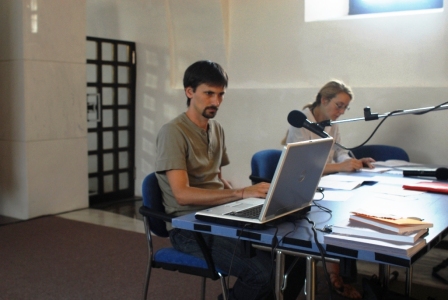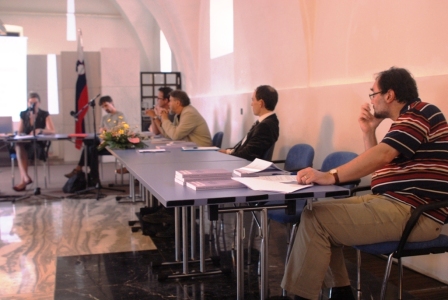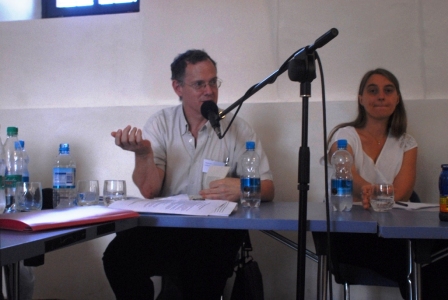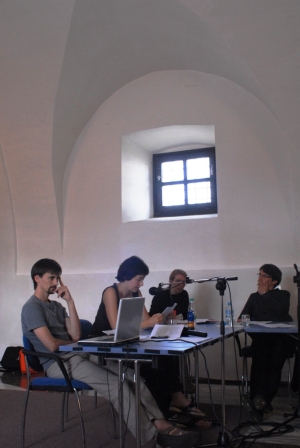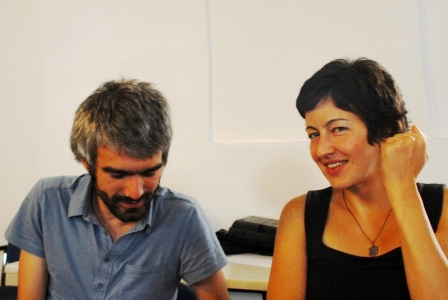Šesti
mednarodni komparativistični kolokvij
6 th
International Comparative Literature Colloquium
Avtor: kdo ali kaj piše literaturo?
The Author: Who or What Is Writing Literature?
(program in
povzetki referatov /
programme and
paper abstracts)
fotografije / photos
23. Mednarodni
literarni festival Vilenica
23rd
Vilenica International Literary Festival
Lipica, Poročna dvorana / Lipica, Wedding Hall, 4, 5 September 2008
Vodji kolokvija
/ Directors of the colloquium
Vanesa
MATAJC, Gašper TROHA
Udeleženci /
Participants
Varja
BALŽALORSKY (Filozofska fakulteta, Oddelek za primerjalno književnost in
literarno teorijo, Ljubljana, Slovenija / Slovenia)
Andrej BLATNIK
(Univerza na Primorskem, University of Primorska, Koper, Slovenija / Slovenia
)
Lucia BOLDRINI (Goldsmiths,
Univerza v Londonu, Velika Britanija / Great Britain)
Rebecca BRAUN (Univerza v Liverpoolu, Velika Britanija / Great Britain)
Marijan DOVIĆ (Inštitut za slovensko literature in literarne vede ZRC SAZU,
Ljubljana, Slovenija / Slovenia)
Florian HARTLING (Univerza Martina Luthra v Halle-Wittenbergu,Nemčija /
Germany)
Jonathan L. HART (Univerza v Alberti, Kanada / Canada)
Mojca KUMERDEJ (pisateljica, publicistka, Ljubljana, Slovenija / Slovenia)
Teemu MANNINEN (Univerza Tampere, Helsinki, Finska / Finland)
Jera
MARUŠIČ (Univerza v Edinburgu, Velika Britanija / Great Britain)
Vanesa MATAJC (Filozofska fakulteta, Oddelek za primerjalno književnost in
literarno teorijo, Ljubljana, Slovenija / Slovenia)
Boris A. NOVAK (Filozofska fakulteta, Oddelek za primerjalno književnost in
literarno teorijo, Ljubljana; Slovenija / Slovenia)
Julia A. SOZINA (Institute of Slavic Studies, Russian Academy of
Sciences, Moskva, Rusija /
Russia)
Jüri TALVET
(Univerza v Tartuju, Estonija / Estonia)
Gašper TROHA (Filozofska
fakulteta, Oddelek za primerjalno književnost in literarno teorijo, Ljubljana,
Slovenija / Slovenia)
PROGRAM KOLOKVIJA / THE PROGRAMME OF THE COLLOQUIUM
Četrtek, 4. september / Thursday, September 4th
15.00
Pozdravni nagovor / Address
Vanesa MATAJC, predsednica SDPK/ SiCLA president, Gašper TROHA, tajnik SDPK
/ SiCLA secretary
15.15.-16.15
Prvo zasedanje / First Session
Rebecca BRAUN: Avtorstvo in literarna zvezda / Authorship and Literary
Celebrity
Andrej BLATNIK: Od avre umetniškega dela do (psevdo)avre avtorja / From
the Aura of the Literary Work to the (Pseudo-)Aura of the Author
Jüri TALVET: Literarno ustvarjanje kot semiosferično dejanje simbioze /
Literary Creation as a Semiospheric Act of Symbiosis
16.15.-16.45 Diskusija / Discussion
16.45-17.00 Odmor / Coffee Break
17.00-18.00
Drugo zasedanje / Second Session
Mojca KUMERDEJ: Med božjo iskrico in lastno smrtjo / Between the Divine
Spark and One's Own Death
Boris A. NOVAK: Apologija avtorja / An Apology of the Author
Florian HARTLING: Digitalni avtor? Avtorstvo v digitalni dobi / The Digital
Author? Authorship in the Digital Era
18.00-18.30
Diskusija / Discussion
Petek, 5. september / Friday, September 5th
9.00-10.20
Tretje zasedanje / Third Session
Jera MARUŠIČ: Aristotelova Poetika: pesništvo kot mimesis /
Aristotle's Poetics: Poetry as Mimesis
Marijan DOVIĆ: Antične korenine modernega avtorskega koncepta / Classical
Roots of the Modern Authorial Concept
Teemu MANNINEN: »To moje igračkanje.« Legenda Sira Philipa Sidneyja in
zgodovina avtorstva / »This Idle Worke of Mine.« The Legend of Sir Philip
Sidney and the History of Authorship
Gašper TROHA:
Avtor je mrtev,
živel avtor! /
The Author Is Dead.. Long Live
the Author!
10.20-11.00 Diskusija / Discussion
11.00-11.15 Odmor / Coffee Break
11.15-12.35
Četrto zasedanje / Fourth Session
Lucia BOLDRINI: Heterobiografija, hipokritičnost in etika avtorske
odgovornosti / Heterobiography, Hypocriticism, and the Ethics of Authorial
Responsibility
Jonathan L. HART: Drugost in vprašanje avtoritete / Otherness and the
Question of Authority
Varja BALŽALORSKY: Jaz je Drugi: subjekt pesmi v procesu, subjekt v procesu
pesmi / Self Is the Other: The Subject of the Poem in a Process, the Subject
in the Process of a Poem
Julia A. SOZINA: Avtor kot psihološka, intelektualna in nravstvena celota v
slovenskem romanu zadnje tretjine 20. stoletja / The Author as a
Psychological, Intellectual and Moral Whole in the Slovene Novel of the Last
Third of the 20th Century
12.35-13.15 Diskusija / Discussion
13.15.-13.30 Sklepne besede kolokvija / Conclusion of the Colloquium
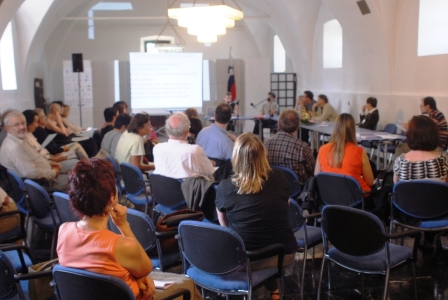
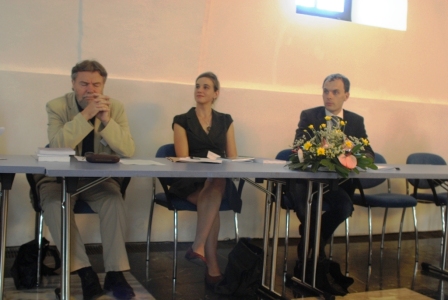
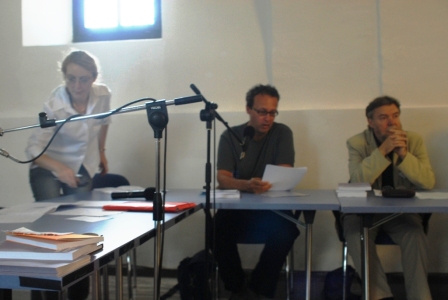
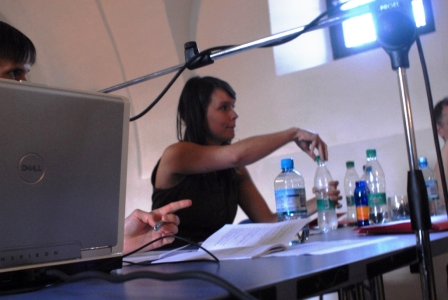
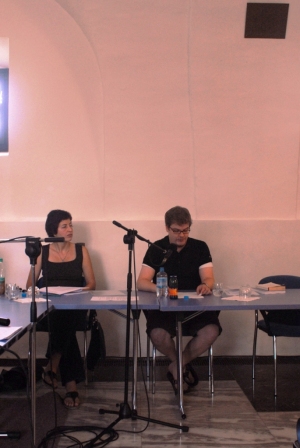
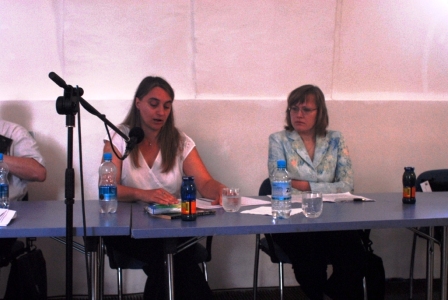
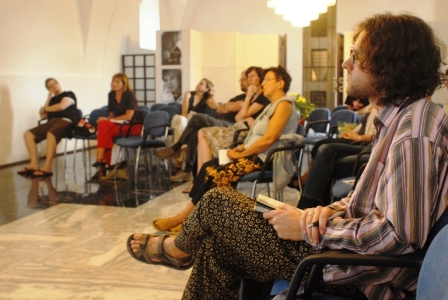
Vanesa Matajc
»Avtor:
kdo ali kaj piše literaturo?«
Sodobna literarna teorija raziskuje vlogo avtorja v ustvarjanju literarnega besedila kakor tudi v ustvarjanju (literarne) kulture. Reprezentacije avtorja odgovarjajo na vprašanje njegove vloge na mnoge različne načine, odvisno od zgodovinske kulture in dojemanja literature. Ta situacija, ki se nadaljuje v sodobni literarni teoriji, se seveda razlikuje od ti. modernih pogledov na literaturo, tj. pogledov, ki so se oblikovali od renesanse naprej.
Sodobna literarna teorija je začela prevraševati vlogo avtorja v ustvarjanju literature v času, ko se je zastavilo vprašanje o vlogi jezika v ustvarjanju subjekta. Obdobje modernosti je termin (literarni) avtor dojemalo v »nedvoumno« jasnem pomenu: ker je moderna tradicija obravnavala človeka kot ustvarjalni subjekt s sposobnostjo iznajti ali odkriti nove objekte, je »iznašla« tudi besedo »avtor« v smislu posameznika, ki ustvarja literarno (ali metaliterarno) besedilo. To individualno literarno umetniško delo se je razumelo kot neponovljiva (izvirna) sinteza forme in vsebine, v kateri bralec prepoznava (odkriva) pomene in smisel, kakor jih je ustvarila avtorjeva volja, namen in veščina.
Moderni koncept avtorja je v sodobnosti doživel nekaj temeljnih sprememb zlasti od šestdesetih let 20. stoletja naprej; te spremembe so povzročili ti. obrat k zgodovini, obrat h kulturi in – morda najvažnejši za vprašanje literarne ustvarjalnosti – obrat k jeziku. V humanistiki so, pogosto interdisciplinarno, sooblikovali tudi nove discipline ali nove teorije (spremembe izpostavijo npr. epistemologijo, kulturne študije, antropologijo kulture, ženske študije, študije spola, postkolonialne študije in (prenovljeno) kulturno zgodovino).
Odgovor na vprašanje »kdo ali kaj piše literaturo?« se je tako razcepil v dve smeri.
Prvič, izhodiščna predpostavka, da realnost vzpostavlja jezik, (konvencija, in ne individualna invencija), se je zjedrila v idejo Jezika, ki piše / govori literarni tekst in določa njegovo recepcijo. Tako se je avtor kot ustvarjalni subjekt literarnega umetniškega dela nadomestil s konceptom intertekstualnosti oz. z dialoškimi razmerji.
Drugič, izpostavljanje intertekstualnosti, predpostavke o »smrti avtorja« in »vstajenju« teksta in bralca so pod vprašaj postavile poleg avtorja tudi avtorjevo avtoriteto v literarni in kulturni tradiciji (reprezentirani kot literarni ali kulturni kanon) ter v (kulturni) politiki. Avtorjeva politična avtoriteta je bila še zlasti očitna v literaturah, ki so rabile namenom nacionalnih ideologij ali političnih totalitarizmov. Oba ideološka pritiska sta značilna izkušnja literatur in njihovih avtorjev v Evropi, nekdanji Sovjetski zvezi, itn.
Avtor se je dojemal kot konstitutivni dejavnik kulturnih tradicij, pogosto kot sredstvo, s katerim so lahko različne politične skupine legitimirale svojo oblast. Literarni tekst, ki nastopa v pragmatični (kulturno-) politični vlogi, potrebuje in zahteva interpreta. Tudi če je avtor »mrtev«, lahko avtorja kot ustvarjalni subjekt nadomesti kulturno-politični interpret besedila. Interpret, ki nadomešča literarnega avtorja, združuje obe vlogi: vlogo avtoritete in vlogo inventivnega avtorja (inventivno interpretira literarno besedilo v določenem kulturnem kontekstu).
S tem pa je interpretova praksa lahko tudi emancipacijsko dejanje. Emancipacijsko za različne družbene skupine, ki se prepoznajo kot zatirane in za poudarjanje svoje vrednosti uporabijo ustrezno interpretirano literarno besedilo; in emancipacijsko dejanje za avtonomijo literature. »Vstajenje« avtorja (A. Nehamas) ali avtorjeve vloge – tudi če se ta nanaša na interpreta – je lahko tudi način, ki vzpostavlja / ohranja avtonomijo, literarnost, literarnega diskurza.
Teme kolokvija
1) Avtor kot individualni ustvarjalec in avtor v razmerju s kulturo: vloga avtorja v zgodovinskih invencijah tradicije, avtor kot diskurzivni konstrukt v vzpostavljanju socialno-političnih identitet, avtor v proizvodnih mehanizmih kulture;
2) Osebna izkušnja literarnega ustvarjalca, avtor kot subjekt literarnosti in literarnega dela, koncepti avtorja v 20. stoletju: virtualni avtor v novih medijih in medbesedilnosti;
3) Antična Grčija in vprašanje »kdo ali kaj ustvarja literarni tekst (ali: literarno umetniško delo)«; Renesansa in iznajdba avtorja v moderni zahodni literarni teoriji; avtorska performativnost in avtobiografija v 20. stoletju;
4) Avtor med jazom in drugostjo, avtobiografijo in heterobiografijo, avtorska integriteta in avtoriteta od lirike prek romanopisja do postkolonialnih študij
Vanesa Matajc
“The Author: Who or What Is Writing Literature?”
Contemporary literary theory examines the author’s role in the creation of a literary text, as well as of (literary) culture. Representations of the author's role answer these two questions in many different ways, depending on the historical culture in which the questions appear. This situation, which still qualifies as the contemporary situation in literary theory, of course differs from the so-called modern views on literature, that is, views developed since the Renaissance period.
Contemporary literary theory began to re-examine the author's role in creating literature at the very moment when the role of language in creating subjectivity came under scrutiny, whereas the modern period had endowed the term “(literary) Author” with an “undoubtedly” clear meaning: considering the human being as a creative subject with an inherent ability to invent or reveal completely new objects, the modern tradition “invented” the word “Author” in the sense of a recognisable individual who writes (or creates in the sense of invention) a literary text. This individual text / work of art was likewise conceived as a unique combination of form and content, revealing its recognisable meanings and sense as created by the author’s will, intention, and ability. In the contemporary period, the modern concept of the author has undergone some basic changes since the 1960s – changes caused by the so-called historical turn, cultural turn, and – probably the most relevant to the question of literary creation – linguistic turn. Often interdisciplinary, these have operated in the humanities, including some newly founded disciplines and theories, such as epistemology, cultural studies, cultural anthropology, women's studies, gender and queer studies, post-colonial studies, and (renewed) cultural history.
The answer to the question of “who or what is writing literature” has therefore split to pursue two possible directions.
First, the initial presupposition of reality being created by language (by a convention rather than an individual invention) has crystallised into the idea of Language writing / speaking a literary text, as well as orchestrating its reception. The author as the creative subject of a literary work of art is therefore being replaced with the concept of the intertextuality, the inherent plurality of the dialogical relationship.
And secondly, pointing out the idea of intertextuality, the presuppositions of “the death of the author” and of the “resurrection” of a text and its reader have called into question the author's authority in the literary and cultural tradition (represented as a literary or cultural canon) and in the (cultural) politics. The author’s political authority has been particularly obvious in literatures subjected to the pressure of national ideologies or political totalitarianism. Both ideological pressures have been a characteristic experience of the literatures of Europe, of the former Soviet Union, etc. The author has been conceived as a constitutive performer of cultural traditions, and thus of the means by which different political groups have been able to legitimise their power. Even if “dead”, the author as a creative subject could be replaced with a cultural-political interpreter of the text. The interpreter, replacing the author of a literary text, can unite both roles: the role of an authority and of the inventive author.
In addition, the interpreter's practice may be an emancipating gesture for various social groups becoming aware of their suppression. On the other hand, such a gesture can also provide the emancipation of literature as an autonomous discourse. The “resurrection” of the author’s role, even when referring to the interpreter, can also be a way of providing the autonomy, “literariness”, of literary discourse.
Thematics and Scopes
1) The Author as an individual creator and the Author in the relationship with his / her culture: the role of the Author in historical inventions of traditions, the Author as a discursive construction in constructing of the socio-political identities, the Author in producting mechanisms of the cultures
2) The Author as a personal experience, the Author as a subject of literariness and of a literary work, the concepts of the Author in the 20th century: virtual author in the new multimedia and its intertextuality;
3) Ancient Greek and the question »who or what is creating literary text (or: literary work of art)«, Renaissance and the invention of the Author in the modern Western literary theory, authorial performativity and authobiography in the 20th century;
4) The Author between Self and the Otherness, the author between autobiography and heterobiography, the authorial integrity and authority from lyrical poetry over novels to the post-colonial studies.
Varja Balžalorsky
Jaz
je Drugi: subjekt pesmi v procesu, subjekt v procesu pesmi
Kljub načelnim, konciznim ali zgolj shematičnim, razrešitvam problematike odnosa med literarnim subjektom in empiričnim avtorjem v literarnovednem diskurzu druge polovice preteklega stoletja se na manj teoretični, t. j. na kritiški, esejistični, pedagoški in nenazadnje bralski ravni vprašanje t. i. lirskega subjekta še vedno tesno navezuje na vprašanje avtorja in avtobiografske dimenzije pesmi. Obenem je tudi v nekaterih teoretičnih obravnavah v zadnjem desetletju zaznati ponoven pretres tez npr. K. Hamburger ali E. Steigerja, ki znameniti Lyrisches Ich enačita z realnim, eksistencialnim subjektom – pesnikom.Vendar na romantični koncepciji poezije kot izpovednega izraza individualne notranjosti izoblikovani nepreseženi recepcijski topos ne predstavlja edinega trna v peti sodobnega diskurza o poeziji.
V referatu bom vsaj delno problematizirala oba zgornja koncepta. Prvi koncept s fenomenološkimi in (post)strukturalističnimi redukcijami v maniri Barthesove sintagme »smrt avtorja«, ki so zamajale »absolutni značaj in utemeljiteljsko vlogo subjekta« (Foucault), znotrajbesedilni (lirski) subjekt zapre v tekst, še vedno obravnavan v polju jezika kot sistema (langue) in ne diskurza (discours), in ga fiksira kot enotno, monološko, zgolj govorno fikcijsko instanco. Posledica skrajnih redukcionističnih formalističnih pogledov je med drugim tudi izbris oz. neupoštevanje etične dimenzije, ki jo avtorska funckija (Bahtin, Foucault), kakorkoli jo že opredelimo, vselej vnaša v konfiguracijo teksta-diskurza.
Na tej praktično-teoretični-operativni ravni se vzpostavlja potreba, da na podlagi novejših teoretičnih in metateoretičnih pogledov na literarno umetnino, najprej in predvsem pa na podlagi samih literarnih tekstov premislimo in skušamo ponovno opredeliti ravni, na katerih se v lirskem diskurzu razpršeno artikulira subjektiviteta, ki ustvarja pesniški diskurz ter se s pesniškim diskurzom in v njem ustvarja. Zadnji stavek nas pelje k vprašanju, ki ga implicira drugi zgoraj izpostavljeni koncept. Ta je seveda problematičen zaradi psihologistične preobremenjenosti z biografskimi in psihološkimi referencami, ki seveda ne morejo predstavljati interesnega polja sodobne literarne vede, obenem pa izjemno zanimiv, ker s tem enačenjem odpira pot vprašanju o subjektu pesmi. Ta se morda kaže kot specifičen subjekt, različen od psihološkega, filozofskega, psihoanalitičnega, ideološkega itd. subjekta (Meschonnic) ali vsaj od refleksivnega-logiškega-kartezijanskega subjekta (Novalis, Frank, Kristeva, Rodriguez).
Če
se
omejimo
zgolj
na
tisti
sklop
lirskih
besedil,
kjer
je
mogoče
govoriti
o
prekrivanju
različnih
artikulacijskih
polj
besedilne
subjektivitete
na
način,
da
se
konfigurira
navidezno
enoten
lirski
subjekt
v
smislu
bolj
ali
manj
avtorskega
subjekta,
lahko
opozorimo
na
nekatere
vzporedne
momente v zgodovini teorije poezije ter na poetološke spise
samih avtorjev, ki vsak v danem duhovnozgodovinskem horizontu bolj ali manj
eksplicitno obravnavajo rojstvo oz. postajanje tega drugega subjekta
pesmi, seveda predvsem na ravni subjekta izjave - lirskega jaza.
Varja
Balžalorsky
Self
Is the Other: The Subject of the Poem in a Process, the Subject in the Process
of a Poem
Despite fundamental, concise, or only schematical investigations of relationships between a literary subject and an empirical author in the literary criticism of the second half of the 20th century, it is still common for reviews, essays and educational programmes to connect the literary lyrical subject with the author and his/her biography. Some of the recent theories return to the thesis of K. Hamburger and E. Staiger, who equalize the famous Lyrisches Ich with an empirical author, e.g. poet. However, this concept, which was established in Romanticism and has not yet been replaced, is not the only problem of the current discourse on poetry.
In my presentation I will deconstruct both of the abovementioned concepts. The first by means of poststructuralist and phenomenological reductions of Barthes’ concept of the “death of the author”, which dethroned “an absolute and inventive nature of a subject” (Foucault). It closes the subject of the text inside the text itself, and still investigates it as a part of the language as system (langue) and not as a part of a discourse, and thus understands it as a monolith and as merely a verbal fictional entity. One of the consequences of the latter is the effacement of an ethical function that is inevitably returned into the text-discourse relationship by the author (Bakhtin, Foucault).
Therefore it is necessary to redefine the subjectivity which creates poetical discourse and is created by it, considering recent theoretical, meta-theoretical and literary texts. This, however, leads us to the second concept which is problematic because of its dependence on psychology and biographical data and thus cannot be applied to contemporary literary science. At the same time it opens up interesting questions on the subject of the poem. The latter might be a specific subject who is different from the psychological, philosophical, psychoanalytical, ideological etc. subject (Meschonnic), or at least different from the rational-logical-Cartesian subject (Novalis, Frank, Kristeva, Rodriguez).
If we restrict our analyses to texts which manage to formulate a subject that is more or less uniform and bears resemblance to the empirical author, we can observe some parallels between theoretical and auto- poetical texts. They both deal with the creation of another, mostly on the level of the subject of the utterance - the lyrical self.
Andrej Blatnik
Od avre
umetniškega dela do (psevdo)avre avtorja
Čeprav je poststrukturalistična teorija oznanjala smrt avtorja, čeprav ga je npr. ameriška metafikcija uspešno razstoličila kot odločilni dejavnik besedila in čeprav recepcijska estetika prenaša težišče z avtorja na bralca, se zdi, da je dejansko stanje, vsaj kar zadeva zunajliterarnega in ne znotrajliterarnega avtorja, prav nasprotno.
V času, ko je v vsaki kulturi za branje na voljo vse več avtorjev (teorija 'dolgega repa'), hkrati pa vse več ljudi bere vse bolj iste knjige (teorija 'homogenizacije kanona'), je avtor dandanes večji dejavnik literarnega polja kot kadarkoli v zgodovini.
Po načinu vzpostavitve avtorjeve opaznosti pa se kulture razlikujejo: če je v ameriški literarni proizvodnji izpostavljen avtor, ki je tako ali drugače slaven (celebrity), je v slovenski opažen tisti, ki se vzpostavi kot žrtev. Preveriti pa velja, koliko k avtorski veličini prispevajo uporabe proizvodnih principov kulturne industrije in množične kulture in koliko tisto, kar ga naredi avtorja – samo dejstvo avtorskega dejanja.
Andrej Blatnik
From the Aura of the
Literary Work to the (Pseudo-)Aura of the Author
Poststructuralism declared the death of the author, American metafiction successfully dethroned him/her as a crucial factor in the text, and reception theory shifted its focus from the author to the reader.
Nevertheless, it seems that reality, at least with regard to the author as a nonliterary category, shows a completely different picture. Today, when there are more and more authors available (theory of a “long tail”) and people read the same books (theory of a “homogenization of the canon”), the author’s role in the literary field has become more important than ever.
Nevertheless, the way of establishing the author’s fame differs from culture to culture – the American culture promotes an author who is in one way or another a celebrity, the Slovene one promotes the author who has been victimized. The research focuses on the impact of different factors – cultural industry, pop culture and the author’s actual work – on establishing an author and his/her fame.
Lucia Boldrini
Heterobiografija,
hipokritika in etika avtorjeve odgovornosti
V tem prispevku bi rada pretehtala nekaj vidikov razprave o etični povezovanju avtorja z njegovimi/njenimi besedami. Primerne za ta namen se mi zdijo fiktivne avtobiografije zgodovinskih osebnosti (»heterobiografije«) – romani, katerih pripovedovalec je prepoznavna zgodovinska osebnost in ki so pisani v prvi osebi, vendar jih je napisal nekdo drug.
Posebej se bom ukvarjala z romanom Petra Careya True History of the Kelly Gang (Resnična zgodovina Kellyjeve bande) o razvpitem avstralskem prestopniku Nedu Kellyju (ta roman se sprašuje o dejanski veljavnosti avtobiografske pripovedi in tudi o etičnih posledicah prilastitve življenjske zgodbe in glasu nekoga drugega) in z romanom Gilberta Adaira The Death of the Author (Smrt avtorja), ki se z naslovom nanaša na Barthesovo teorijo avtorstva, dejansko pa temelji na Paulu de Manu, ki je rahlo zakrinkan v literarno osebo francosko-ameriškega ustvarjalca »Teorije«, Leopolda Sfaxa, in ta roman prispeva številna vprašanja k razpravi, ki jo je sprožilo odkritje de Manovega medvojnega žurnalizma.
Oba romana
nakazujeta, da problema neposredne avtorske odgovornosti, ki se sicer lahko zdi
povsem premočrtna in očitna, ni mogoče dojemati neodvisno od odgovornosti /brez
ozira na odgovornost bralca, naslovnika in kritika, in opozarjata na
nezadostnost splošno sprejetega pojma »integriteta«.
Lucia
Boldrini
Heterobiography, Hypocriticism, and the Ethics of Authorial Responsibility
In this paper I wish to discuss some aspects of the debate on the ethical link between author and his/her words. To this end I shall consider the example of fictional autobiographies of historical figures (“heterobiographies”) – novels written in the first person, whose narrator-protagonist is a recognisable historical individual, but which are written by another.
In particular I shall look at Peter Carey’s True History of the Kelly Gang, on the notorious Australian outlaw Ned Kelly (which involves questions about the legal standing of the autobiographical narrative, as well as on the ethical implications of the appropriation of another’s story and voice), and Gilbert Adair’s The Death of the Author, whose title refers to Barthes’s theory of authorship, but is in fact based on Paul de Man (thinly disguised under the French-American critic inventor of “The Theory” Leopold Sfax) and raises a number of questions about the debate provoked by the discovery of de Man’s wartime journalism.
These
novels suggest that the issue of direct authorial responsibility, which might
appear so linear and transparent, cannot be taken independently of the
responsibility of the reader, addressee, and the critic, and point to the
shortcomings of a simple notion of “integrity”.
Rebecca Braun
Avtorstvo in
literarna zvezda
Referat preučuje razmerje med avtorstvom in slavo ob koncu 20. in v začetku 21. stoletja. Regionalna, nacionalna in / ali korporativna korporacijska praksa kulturnih nagrad je je v mnogih deželah vsega sveta vzpostavila ustvarjanje in izmerjanje literarne slave. Kritiki te literarnorecepcijske kulture izražajo bojazen, da sam avtor / avtorica v njej nastopa skoraj zgolj in samo kot projekcijski zaslon za sodobno socialno-politično debato, ki vselej zgreši resnično literaren dosežek, obenem pa mnogi avtorji, skladno s Pierrom Bourdieujem in njegovim dojemanjem kulturnega polja, z gnusom zavračajo, da bi se odkrito poistovetili z ekonomsko samozadostno kulturno industrijo.
Vendar pričujoči referat zoper težnjo, da bi dojemali literarno avtorstvo v popačeni podobi, ki jo ustvarja sodobna recepcijska kultura, raziskuje, kako lahko avtorji dejansko spretno delujejo znotraj koda literarne zvezde in si ga prefinjeno prilagodijo, tako da se njihova osebna avtonomija literarnega proizvajalca brezkompromisno ohrani. S tem ko dopuščajo, da se njihova javna avtorska identiteta koristi in fetišizira, avtorji razprejo prostor med svojo javno osebo in svojo besedilno osebo, kar kliče po teoretskem premisleku o sami naravi konstrukcije in recepcije identitete, tako v literaturi kakor v realnosti.
Z analizo novejše zgodovine Nobelove nagrade za literaturo in tistih govorov nagrajencev, ki so bili v zadnjih dvajsetih letih najbolje sprejeti, referat preverja, kako dojemamo avtorje in kolikšne možnosti imajo, da kot individualni literarni ustvarjalci, kot nacionalno- ali mednarodno-politični predstavniki in kot transnacionalne medijske zvezde vplivajo na naše dojemanje avtorstva.
Rebecca Braun
Authorship and Literary Celebrity
This paper investigates the relationship between authorship and fame in the late twentieth and early twenty-first centuries. A regional, national and / or corporate prize culture has come to create and measure literary fame in many countries across the world. The critics of such cultures of literary reception fear that the author him/herself appears as little more than a projection screen for contemporary socio-political debate that invariably misses the point of truly literary achievement, while many authors themselves, in line with Pierre Bourdieu’s understanding of the cultural field, are loath to identify openly with an economically self-serving culture industry.
Against the tendency to see literary authorship as distorted by its contemporary culture of reception, however, this paper investigates how authors can in fact knowingly work within a code of literary celebrity, subtly adapting it so that their own autonomy as literary producers is anything but compromised. In allowing their public authorial identity to be commodified and fetishized, authors open up a space between their public persona and their textual persona that invites critical reflection on the very nature of identity construction and reception in both literature and the world.
Analyzing the recent history of the Nobel Prize in Literature and a selection of key acceptance speeches from the last twenty years, this paper reconsiders how authors are perceived in the world and what possibilities they have for affecting this perception as individual literary writers, national or international political representatives, and transnational media stars.
Marijan Dović
Antične
korenine modernega avtorskega koncepta
Sodobne teoretske diskusije o »smrti« in morebitnem ponovnem »vstajenju« avtorja (od strukturalizma in psihoanalize do feminizma in postkolonialnih študij) večinoma merijo na model »romantičnega« avtorja kot iz sebe ustvarjajočega, originalnega genija (E. Young) in skritega »zakonodajalca sveta« (P. Shelley). Ni dvoma, da je ta model v temelju zaznamoval moderne evropske literature vse do 20. stoletja, ko ga je (literarna) teorija temeljito vzela v precep. Pri tem je kmalu postalo očitno, da so korenine takšnega razumevanja večplastne. Izvor modernega avtorja je gotovo povezan z nekaterimi spodbudami 18. stoletja (razmah literarnega trga, copyright; predromantične ideje), vendar raziskovalci poudarjajo tudi pomen prejšnjih obdobij, denimo renesanse, ko je že mogoče opazovati oblikovanje vzorca »absolutnega umetnika«, ki se skozi biografski anekdotizem vpisuje v zgodovino likovne in tudi literarne umetnosti.
Moj prispevek bo
skušal z revizijo nekaterih antičnih literarnih tekstov (od Homerja in Hezioda
do Ovidija) in spremljajočega teoretskega metadiskurza raziskati, koliko so
poznejše izpeljave odvisne od antičnih. Poleg tega bom skušal ugotoviti, ali je
razvoj modernega avtorja primerno pojasnjevati z linearno shemo, ki se razteza
od na pol anonimnega rapsoda do samozaverovanega romantičnega genija. Antična
poezija se v tem pogledu izkaže kot zelo raznolika. Predvsem za Ovidijevo
ljubezensko liriko je značilna nenavadno visoka stopnja avtorske zavesti in
igrive prisotnosti v tekstu, ki lahko pod vprašaj postavi vsakršno pretirano
linearno razumevanje razvoja avtorskega koncepta v zgodovini zahodnih literatur.
Posebna pozornost bo posvečena tudi filozofskim diskusijam o avtorstvu, predvsem
prikazu teorije božanske inspiracije pri Platonu (v Ionu, Fajdrosu in
Državi) in kasneje pri Longinusu (O vzvišenem), vplivnim stališčem iz
Aristotelove Poetike ter zanimivima opozicijama aoidos /
poietes in poeta vates / poeta doctus.
Marijan Dović
Antique Roots of the
Modern Authorial Concept
Contemporary theoretical debate on the “death” and eventual “resurrection” of the author (from structuralism and psychoanalysis to feminism and postcolonial studies) mostly refers to the model of the “Romantic” author as an original genius, creating from the inner-self (E. Young), the unacknowledged “legislator of the world” (P. Shelley). It is evident that this model had profoundly determined modern European literatures till the 20th century when it came under a thorough scrunity of (literary) theory began to scrutinize it thoroughly. The roots of such understanding proved to be heterogeneous. The sources of the modern authorial concept are of course connected to certain impulses of the 18th century (growth of the literary market, copyright; pre-Romantic ideas), but researchers have also emphasized the role of earlier periods such as Renaissance, when the pattern of an “absolute artist” was already taking shape.
My paper will revise some layers of Greek and Roman poetry (from Homer and Hesiod to Ovid) and the accompanying theoretical discourse to explore how much the later views on authorship were indebted to antiquity. I will also try to find out whether it is adequate to explain the development of the modern authorial concept with a linear scheme stretching from half-anonymous rhapsodist to self-confident Romantic genius. Especially in Ovid’s love poetry, one can find a surprisingly high degree of authorial awareness and playful presence in the text, which can challenge any simplified linear understanding of the authorial concept in the history of Western literatures. Special attention will also be paid to philosophical discussions on authorship (Plato, Aristotle, Longinus), the theory of divine inspiration, and the interesting oppositions aoidos / poietes and later poeta vates / poeta doctus.
Florian Hartling
Digitalni avtor? Avtorstvo v digitalni dobi
Vse od rojstva »svetovnega spleta« kot najuspešneje internetne aplikacije so literarni teoretiki (Landow, Bolter) upali, da bo da bo nov digitalni medij naposled dopustil »smrt avtorja« in rojstvo »pišočega bralca«. Hipertekst kot nov besedilni žanr se je zdel dovolj močan, da bi izpolnil staro upanje poststrukturalistov (Barthes, Foucault).
Čeprav je literarna teorija večinoma opustila to zaneseno upanje, se zdi, da internet v sedanji literarni produkciji še vedno ohranja moč svojega načeloma »brezavtorskega« medija: razvpita enciklopedija Wikipedija dopušča domnevo, da je sâmo, skupinsko napisano besedilo pomembnejše od avtorjev. Literarni eksperimenti v digitalnih medijih celo raziskujejo, kako je mogoče napisati besedilo le s pomočjo tekstovnih algoritmov. Tovrstni projekti sploh več ne potrebujejo avtorja; saj uporabljene podatke preskrbijo kar računalniški iskalniki.
To naivno
predstavo o brezavtorskem tekstu je kaj lahko spodbiti. Prvič, novi mediji so
omogočili ponovno oživljenje in celo razcvet avtorja. Drugič, za razliko od
hitro rastoče produkcije skupinskih internetnih novinarskih tekstov, takšne
literarne produkcije praktično ni. Tretjič, kljub skupinskim projektom ali »kodnim
delom« se funkcija avtorja ne izgubi, marveč se le razprši na različne osebe,
kar lahko vodi celo k »disociiranemu« avtorstvu. Avtor torej v dobi interneta ni
umrl, saj so mu njegove lastnosti zagotovile preživetje. Še več, internet je
zanj postal pravzaprav nekakšen vrelec mladosti, kar bom skušal utemeljiti z
nedavno izvedenimi eksperimenti o avtorstvu v digitalni dobi.
Florian Hartling
The
Digital Author? Authorship in the Digital Era
Since the birth of the “World Wide Web” as the most successful application of
the Internet, literary theorists (Landow, Bolter) have hoped that the new
digital media would finally permit the “death of the author” and the birth of
the “writing reader”. The hypertext as a new text genre seemed to be powerful
enough to fulfil the older hopes of the poststructuralists (Barthes, Foucault).
Although these euphoric hopes have been abandoned by literary theory for the most part, the Internet in the actual literary production still seems to have the power to be an “authorless” medium in principle: In the heavily discussed encyclopaedia “Wikipedia”, for example, the collaboratively written text supposedly is more important than the authors. Literary experiments in the digital media are exploring how texts can be written just by text-algorithms. These projects finally do not need writers anymore; they are using data taken from search engines.
But this somewhat naive idea of an “authorless” digital medium can clearly be refuted. First, the author has been revived by the new medium and continues to thrive within it. Second, in contrast to the prediction of huge “authorless” collaborative text-production in online journalism, it is hard to find any collaborative works of literature. Third, even with collaborative projects or “codeworks”, the function of an author does not disappear but attends to several persons, which can even lead to a “dissociated” authorship. The author cannot disappear or “die” on the Internet, because its characteristics will not allow this to happen. Therefore the Internet does not stand for the “death” of the author; it actually appears to be a fountain of youth for literary authorship instead. These findings are discussed on the basis of recent experiments with authorship in digital literature.
Jonathan L. Hart
Drugost in problem avtoritete
Primerjave med kulturami odpirajo nove perspektive. Pričujoči referat je primerjalna razprava o Zahodnih Evropejcih, o tem, kako so se sporazumeli z drugostjo staroselcev Novega sveta in kako so kot avtorji problematizirali svojo lastno avtoriteto ter dejansko svoj pogled na svet. Reprezentacija staroselcev je tema, ki se nenehno obnavlja. Ta reprezentacija in “prevod” sta pogosto vključevala tako premago nad drugimi, “barbarskimi” kulturami - ali sporazumetje z njimi - kakor tudi dediščino tamkajšnje predhodne vladavine ali tekmeca. Osebnosti, kot so Kolumb, Caminha, Las Casas, Vitoria, Montaigne, Léry, Raleigh, Shakespeare, Aphra Behn in drugi očividci trka s staroselci in sužnji, ali tisti, ki predstavljajo drugost obeh Amerik, so s svojimi pričevanji odprli vprašanje svoje avtoritete. V določenih besedilih se je sočasno pojavilo podomačevanje tujega in potujevanje domačega. Običaji, ženske, kanibali, vse to priklicuje Herodota, Plinija, Tacita in druge predhodnike. Teoretiki, kot sta Tzvetan Todorov in Michel de Certeau, sta obravnavala drugost v kontekstu poročil s potovanj po novem svetu, sam pa bom poskusil to obravnavati v bolj poudarjeno primerjalni perspektivi. Razpravo nameravam razširiti preko zanimanja, ki sta ga teoretika pokazala za Cortésa in Montaignea. Problemi, kot so navzočnost tam, retorična pogodba med piscem in bralcem ter tipologija Starega in Novega sveta me bodo zanimali z vidika resnice in laži, o čemer se morajo pogoditi avtorji in bralci popotnih poročil. To imamo lahko za etnologijo branja ali za uporabo etnologije, zato da bi uvideli drugost znotraj njih ali da bi uvideli med jazom in drugim dramatično tenzijo, kakršno so izkušali pisci in bralci nekoč in jo izkušajo danes.
Jonathan L. Hart
Otherness and the
Question of Authority
Comparisons among cultures open up new perspectives. This paper is a comparative discussion of western Europeans and how they came to terms with the otherness of Natives in the New World and how that called into question their own authority as authors and indeed their worldview. This representation of the Natives is a recurrent theme. Often this representation and “translation” involved an overcoming of or coming to terms with other “barbarous” cultures as well as an inheritance from a previous empire or a rival. Figures like Columbus, Caminha, Las Casas, Vitoria, Montaigne, Léry, Raleigh, Shakespeare, Aphra Behn and others raise issues of their own authority in terms of being eyewitnesses to encounters with Natives and slaves or as those who represent the strangeness of the Americas. Making familiar the strange and the strange the familiar occur simultaneously in some texts. Customs, women, cannibals all recall Herodotus, Pliny, Tacitus and other antecedents. Theorists, like Tzvetan Todorov and Michel de Certeau, have discussed otherness in the context of new world travel accounts, but I will try to do so from a more overtly comparative point of view. I will try to widen the discussion beyond their interests in Cortés and Montaigne. Questions of being there, of the rhetorical contract between writer and reader, and the typology of the Old and New World will be among my concerns over the truth and lies that the authors and readers of travel accounts must negotiate. This might be ethnology of reading or a use of ethnology to see the otherness within or the dramatic tension between self and other that writers and readers then and now experience.
Mojca Kumerdej
Med božjo iskrico in
lastno smrtjo
Kljub sodobnim
literarnim teorijam, ki so piscu snele lovoriko avtorstva kot neponovljive
izvirne sinteze forme in vsebine in so vcepile dvom v ustvarjalnost kot učinek
avtorjeve volje, veščin in namena, se v ustvarjalnem procesu ohranja ena
ključnih potez tradicionalnega pojmovanja avtorstva – narcizem kot podaljšek
infantilnega obdobja in z njim povezan občutek zmožnosti kreacije v polju
neomejenih možnosti. Narcizem je neobhoden za avtorjevo željo po izpostavitvi
lastnega dela in s tem tudi sebe v javnosti, od katere pričakuje in zahteva
pohvale in nagrajevanje in je ob nasprotnih recepcijah nemalokrat otroško
užaljen in prizadet. Paradoks literarne - in nemara vsakršne umetniške
ustvarjalnosti - je v tem, da se pisec čuti najbolj na sebi in za sebe v tistih
ustvarjalnih obdobjih, ko se mu zdi, da ga, prežetega z neomejenim, oceanskim
občutjem njegova lastna ustvarjalnost presega, da torej ni sam tisti, ki proces
nadzoruje, ampak je »zgolj« sredstvo ustvarjalnega procesa, hkrati pa je ključni
vezni element tega procesa njegovo ingeniozno veličanstvo – avtor sam. Toda
takšne faze se kaj hitro lahko sprevržejo v svoje nasprotje, ko eruptivni vrelec
nenadoma usahne in celo za daljše obdobje, včasih pa za vekomaj, povsem
presahne. Zaradi zagonetnih mehanizmov ustvarjalnih procesov, ki vsebujejo niše,
skozi katere kdaj pa kdaj poblisne kaka »božja iskrica«, ki jo avtor skozi
ustvarjalni užitek doživlja kot presežek vsakodnevne eksistence, a hkrati kot
svojo lastno inovacijo, in pa zaradi posebnega statusa umetnosti v sodobnih
družbah kot »nekoristne«, plemenite dejavnosti, ki pa zaradi vse tesnejše
vpetosti v tržne mehanizme ta žlahtni status izgublja, je ustvarjalnost pogosto
najpomembnejši del umetnikove identitete. Prav zato se lahko v daljših obdobjih
t.i. ustvarjalnih blokad umetnikova identiteta zamaje ali povsem spodnese celo
do te mere, da se pisec doživlja kot mrtvega avtorja, lastno življenje pa zgolj
kot parazitiranje na preteklih poglavjih svoje biografije.
Mojca
Kumerdej
Between the
Divine Spark and One's Own Death
In spite of contemporary literary theories, which have removed the writer's laurels of authorship as a unique original synthesis of form and content, and planted doubts about creativity as an effect of the author's will, skills and intention, one of the key features of the traditional authorship concept nevertheless survives in the creative process – narcissism as a prolongation of the infantile period and the related feeling of creation ability within a field of unlimited possibilities. Narcissism is indispensable to the author's wish to expose his/her work – and thus himself – to the public, from which he/her expects and demands praise and reward, often meeting unfavorauble reception with a childish resetment and bitterness. The paradox of literary – and perhaps of any artistic creativity – is that a writer feels most authentically him/herself in those periods when it seems to him that, pervaded by an unlimited, oceanic feeling, he is surpassed by his own creativity, that he/she is not the one controlling the proces but “merely” its instrument, while its key binding element is of course his ingenious majesty – the author him/herself. But such phases can easily degenerate into their opposites when the eruptive source suddenly dries up, sometimes for a longer period of time and sometimes even for ever. The creative processes include niches through which there flashes an occasional “divine spark”, experienced by the author through his/her creative pleasure as a surplus of his/her everyday existence and at the same time as his/her own innovation. In addition, art in contemporary societies has the special status of a “useless”, noble activity, but this preciuos status in endangered by its increasing involvement in the market mechanisms. Owing to these factors, creativity is often the most important part of an artist’s identity. That is why extanded “writer’s blocks” may shake or demolish an author’s identity to the point where he/her perceives him/herself as a dead author and his/her own life merely as feeding off the past chapters of his/her biography.
Translation: Smiljana Legradič
Teemu Manninen
»To moje
igračkanje.« Legenda Sira Philipa Sidneyja in zgodovina avtorstva
Zgodovinsko gledano se je koncept avtorstva pojavil skupaj s tiskom in je zato postal značilen za razvoj subjekta v polju kulturne produkcije. Vendar pa so sodobne raziskave zgodovine založništva in predmoderne rokopisne tradicije problematizirale to mnenje in postavile zahtevo po ponovnem premisleku zgodovine avtorstva.
Slednjo je treba premisliti v okviru družbene tekstualnosti, ki korenini v rokopisni tradiciji, kjer imajo teksti in njihovi subjekti več avtorjev. Tak primer je Sir Philip Sidney, ki je postal renesančni pesnik in kulturni heroj po svoji smrti l. 1586.
Njegova dela so dobila nov kulturni status v tiskani obliki in z uredniškimi posegi njegove sestre, grofice Pembroke, ter njenega prijatelja Fulka Grevilla. Glede na to, da Sidney svojih del nikoli ni nameraval objaviti in jih je širil le v rokopisni obliki, sta oba urednika postala dejansko njegova soavtorja.
Analiza zgodovine recepcije Sidneyjevega opusa in rokopisne tradicije pisanja ter izdajanja del lahko pripelje do novih spoznanj o osnovnih vprašanjih zgodovine avtorstva: kdo piše, o čem, komu in kako?
Teemu Manninen
“This Idle Work
of Mine.” The Legend of Sir Philip Sidney and the History of Authorship
Historically, the concept of authorship developed parallel with the printing practice, and as such it has become emblematic of technologies of the self, of the formation of subjectivities in the field of cultural production.
But recent work on the history of the book and early modern manuscript culture has problematized this view, calling for a more nuanced view of historical authorship, a social textuality grounded in the material practices of scribal publication, where texts (and subjectivities) have multiple authors.
An example is Sir Philip Sidney. Due to the establishment of his status as a Renaissance poet and a cultural hero following his death in 1586, his literary works gained a new cultural status in print through the editorship of his sister, the Countess of Pembroke, and his friend, Fulke Greville. Not just editors, they effectively became co-authors of his work, since Sidney never intended to become a public poet, and only circulated his works in manuscript during his lifetime.
Studying Sidney's
complicated reception history parallel with the scribal practices of writing and
publication can shed new light on the fundamental problematics in the history of
authorship: who writes, of what, to whom, and how?
Jera Marušič
Aristotelova Poetika: pesništvo kot mimesis
V času Aristotelove Poetike meje med pesništvom (poiesis) in nekaterimi drugimi vrstami govora, kot so npr. medicinske ali naravoslovne razprave, niso bile jasne in tudi ne splošno priznane. O tem poroča Aristotel sam v Poetiki: v njej oporeka tistim, ki imajo Empedoklesa za pesnika, ne pa za naravoslovca, zgolj zato, ker so njegove razprave v verzih. Kot je znano, Aristotel nasprotno trdi, da ni verz, pač pa mimetični značaj pesniške dejavnosti tisto, po čemer se ta bistveno razlikuje od medicinskega, naravoslovnega in, kot se zdi, tudi zgodovinskega govora. Kot pravi na začetku razprave, je skladanje epov, dram, ali ditirambov, in dalje skladanje glasbe za aulos in druge instrumente, vzeto v celoti, mimesis: mimesis je tako izpostavljen kot element, ki je skupen in značilen za vse vrste pesništva. Vendar kljub temu, da Aristotel v Poetiki pesniško dejavnost obravnava kot mimesis, ne v razpravi ne kjerkoli drugje ne pojasni, v kakšnem smislu naj bi pesništvo razumeli kot mimesis. V referatu bo moj namen pokazati na težavnost Aristotelove opredelitve pesništva kot mimesis in pojasniti, od kod ta težavnost izhaja.
V dokaj dobro dokumentirani predaristotelovski jezikovni rabi mimesis označuje dejavnost, ki jo lahko opredelimo kot ravnanje ali proizvajanje nečesa, ki je namenoma podobno nečemu drugemu v enem ali drugem vidiku, ali krajše, kot ravnanje ali proizvajanje nečesa skozi posnemanje nečesa drugega; npr., igralčevo igranje Sokratove osebe lahko opišemo kot mimesis Sokrata; slikarjevo portretiranje Teajteta lahko opišemo kot mimesis Teajteta. Po svojem pomenu izraz mimesis tako ustreza slovenskima izrazoma ‘posnemanje’ oziroma ‘predstavljanje’. Po mojem mnenju (ki se sicer razhaja s splošno sprejetim, ki pa ga tu ne morem argumentirati), tudi Platon, in tudi v 10. knjigi Države, uporablja izraz mimesis samo v tem pomenu.
Aristotelova opredelitev pesništva kot mimesis ni izvirna; najdemo jo že v Platonovih dialogih. Vendar pa razprave, v katerih Platon obravnava to tematiko, ne podajo jasne in enotne slike pesništva kot mimesis, pač pa je ta slika precej zapletena in na videz celo protislovna. V referatu ne bo mogoče govoriti o vseh teh razpravah; zagovarjala pa bom stališče, da Aristotel v opredelitvi pesništva kot mimesis izhaja iz pojmovanja pesništva, ki je obširneje predstavljeno v 3. knjigi Države in v Zakonih, in ki je tam pripisano predhodnim avtorjem, v Državi izrecno muzikologu Damonu. To pojmovanje pa se ukvarja, kot se zdi, specifično z glasbenim pesništvom, po njem pa mimetični značaj pesništva izhaja iz dveh glasbenih elementov pesniškega skladanja, harmonije in ritma. Ta dva naj bi posnemala določene značaje in življenjske načine: npr., določene glasbene harmonije naj bi posnemale zvoke tožbe, druge zvoke hrabrega bojevanja (Država III 398d-e, 399a); določeni ritmi naj bi posnemali urejeno in hrabro življenje, drugi pa nasilno in divje (Država III 399e-400b). Glasbeno skladanje in izvajanje je tako pojmovano kot nekakšna zvočna in kinetična mimesis oseb določenega značaja, vedenja in načina življenja.
Ko Aristotel
označi pesništvo za inherentno mimetično, se tako lahko zdi, da v tem sledi
Platonu in predplatonski tradiciji. Vendar pa je za Aristotela glasbeno
skladanje le mimesis ene vrste, medtem ko je ne-glasbeno skladanje (npr.
Homerjevo) mimesis druge vrste. Pri tem se prvo skladanje razlikuje od
drugega v sredstvih, skozi katerega se mimesis vrši: v prvem primeru,
skozi harmonijo in ritem, v drugem primeru skozi govor (logos). Prav
tukaj pa nastopi težava; kajti ni več jasno, v kakšnem smislu naj sploh razumemo
pesniško dejavnost kot mimesis. Npr., Homerjevo skladanje kot tako
domnevno ne moremo šteti za mimesis v gornjem smislu: ko Homer
pripoveduje o ljudeh, bogovih, o njihovih dejanjih in o dogodkih, njegovega
skladanja v nobenem očitnem smislu ne moremo razumeti kot neko dejavnost, ki bi
bila namenoma podobna nečemu drugemu. Če torej Aristotel kljub temu pojmuje
Homerjevo skladanje kot mimesis, moramo zaključiti, da razume mimesis
v drugačnem in širšem smislu. V referatu bom poskušala pokazati, kako se
Aristotelovo pojmovanje mimesis-a razlikuje od predaristotelovskega, in
kaj to pomeni za njegovo pojmovanje pesništva kot mimesis.
Jera Marušič
Aristotle’s Poetics: Poetry as Mimesis
At the time of Aristotle’s Poetics, the boundaries between poiesis, ‘poetry’, and various other kinds of discourse, for instance those concerning medical or physical matters, were not obvious or even generally acknowledged. This is testified by Aristotle himself in the treatise: he opposes those who consider Empedocles to be a poet rather than a natural philosopher, insofar as his arguments are stated in verse. By contrast, Aristotle famously argues that it is not verse, but the mimetic character of poetry that fundamentally distinguishes it from various other kinds of discourse: medical, naturalist and, arguably, also historical. As he claims in the opening of the Poetics, the composition of epics, drama, and dithyramb, as well as of music for aulos and other instruments is, on the whole, mimesis: mimesis is thus indicated as an element that is common and specific to all kinds of poetry. But although throughout the treatise Aristotle speaks of poets’ activity as mimesis, he does not ever explain, either here or anywhere else, exactly in what sense poetry should be considered as mimesis. In this paper, my aim will be to point out the difficulties attached to Aristotle’s characterisation of poets’ activity as mimesis and to suggest where these difficulties derive from.
In the relatively well-documented pre-Aristotelian usage, the term mimesis denotes an activity that may be defined as doing or making something that is intentionally like something else in one aspect or another; or shortly, as doing or making something by imitating something else; for example, an actor’s playing the character of Socrates may be referred to as a mimesis of Socrates, a painter’s portraying Theaetetus may be described as a mimesis of Theaetetus. The term mimesis thus corresponds in its meaning to the English term ‘imitation’, or ‘representation’. In my view (which is different from the one generally accepted, but which I must leave undefended here), also Plato, even in Republic X, uses the term mimesis solely with this meaning.
Now, the characterisation of poets’ activity as mimesis is not original to Aristotle, but is found already in Plato’s dialogues: notably, however, Plato’s various arguments on the subject do not provide a clear and unitary picture of poets as mimetai, but rather one that is very intricate and even apparently inconsistent. In the paper, it will not be possible to consider all these arguments; I shall argue, however, that Aristotle bases his characterisation of poetry as mimesis on the account of poetry that is most extensively presented in Republic III and the Laws, and attributed to an earlier tradition, in the Republic more precisely to the musicologist Damon. This account seems to be concerned specifically with musical poetry. According to the account, the mimetic character of poetry is inherent in its musical elements, harmony and rhythm. These are conceived of as being imitative of specific types of characters and modes of life; particular musical modes are said to imitate, or represent, sounds of lamenting or of brave fighting (Rep. III 398d-e, 399a); particular rhythms are imitative of an ordered and brave life, or again, a violent or frenetic one (Rep. III 399e-400b). Through their musical composition and performance, poets (or performers) would thus engage in a sort of vocal and kinetic mimesis of men of a particular character, behaviour and lifestyle.
Characterising poetry as inherently mimetic, Aristotle may thus seem to follow Plato and the earlier tradition. But in fact, musical composing is for Aristotle just one kind of mimesis, while non-musical composing (e.g., Homer’s) is another kind of mimesis, where the two kinds differ in the means through which mimesis is achieved: in the former case, mimesis is achieved through harmony and rhythm, in the latter case through discourse (logos). Here, however, a difficulty arises, for it is not clear exactly in what sense poets’ activity should be understood as mimesis. For example, Homer’s composing as such presumably cannot count as mimesis in the above sense: by narrating about men, gods, their actions and events, Homer is not in any obvious sense doing something that is intentionally like something else. If then Aristotle nevertheless considers Homer’s activity to be a kind of mimesis, we must conclude that he understands mimesis in a different, wider sense. I shall suggest how Aristotle’s understanding of mimesis is different from the pre-Aristotelian conception of it, and how this affects his account of poetry as mimesis.
Boris A. Novak
Apologija avtorja
Literarna veda zadnjih desetletij je sledila postmodernistični demontaži prestola, na katerega je Avtorja posadila romantika in njen zadnji tozadevni poganjek – radikalni modernizem s poveličevanjem principa inovacije. Kult Avtorja, ki je pridobival že božanske atribute z razumevanjem umetniškega akta kot creatio ex nihilo, je bil nedvomno potreben kritike in streznitve.
Veliko vprašanje pa je, ali je umetnost sploh možna brez avtorja. Točneje: podpis avtorja na knjigi prav gotovo ni nujno potreben – roman ali pesniško zbirko ponavadi enako razumemo tudi v primeru anonimnega avtorstva. Vendar ta raven avtorstva ni bistvena – za umetnost je bistvena tista raven, ki jo Jurij Lotman imenuje »način modeliranja sveta«. Ta model, ta prizma, skozi katero je svet prikazan, to je – »avtor«.
Vprašanje razmerja med umetniškim delom in avtorjevo lastno izkušnjo je še bolj zapleteno. Mallarmé je izbrisal princip prvoosebnega lirskega subjekta, a ni bil zato nič manj avtorski – ravno obratno: je eden največjih in najbolj prelomnih avtorjev moderne dobe. A čeprav jo je zamolčal in navidezno izbrisal, se je njegova lastna izkušnja vpisala v pesniški jezik. Lastna izkušnja je ogenj, skozi katerega gredo »besede plemena (les mots de la tribu)« – če naj uporabimo Mallarméjevo formulacijo – da bi pridobile »čistejši pomen (un sens plus pur)« in enkraten, osebni, avtorski zven.
Avtor prispevka bo ilustriral svojo apologijo »Avtorja« tudi z lastnimi avtorskimi pesniškimi izkušnjami.
Boris A. Novak
An Apology of the
Author
The literary criticism of the last decades has been following the postmodernist dismantling of the Author’s throne, which had been set up by Romanticism and its last offshoot – radical modernism, fascinated by innovation. The cult of the Author, who was gaining well-nigh divine attributes through the perception of the creation act as a creatio ex nihilo, was certainly in need of a thorough deconstruction.
However, the question remains whether art without an author is at all possible.
To be more precise, the author’s signature is not necessary at all as we can understand a novel or a book of poetry even if the author is anonymous. The important level is the one that Yuri Lotman calls “the way of modeling the world”. This model, this prism, through which the world is described, is an Author.
The relationship between the author’s actual life and his/her work is even more complicated. Mallarmé effaced the first-person lyrical subject, but was no less authorial. On the contrary, he became one of the most important authors of modern times, whose personal experience was successfully inscribed in his poetic language. One's own experience is a flame through which, to use Mallarmé’s words, “les mots de la tribu” in order to obtain a clearer meaning (un sens plus pur) and a unique, personal, authorial resonance.
The proposed apology of the Author will be illustrated with the presenter’s, Boris A. Novak’s own experience as a poet and writer.
Julija A. Sozina
Avtor kot psihološka, intelektualna in nravstvena celota v slovenskem romanu
zadnje tretjine 20. stoletja
V slovenskem romanu zadnje tretjine 20. stoletja prevladujejo literarni subjekti, ki so močno vezani na družbeno situacijo. Literatura namreč v prvi vrsti postavlja etično-moralno ogledalo družbi. Po M. M. Bahtinu je avtor “edina aktivna ustvarjalna energija”.
S pomočjo literarnih likov v različnih slovenskih romanih, njihovih psiholoških, intelektualnih in nravstvenih stališč, se kažejo sodbe romanopisca kot glasnika nacionalnih usmeritev in popisovalca stanja v sodobni družbi. Od vsakega umetniškega dela se raztezajo nizi analogij, ustreznosti, kontrastov, sorodnih povezav v vse smeri, prav tako pa tudi v literarno preteklost ter sodobno življenje.
Avtorska volja je nujno povezana z aktom ustvarjanja pripovednega dela, v katerem avtor rešuje zase in za družbo pomembna nravstvena, zgodovinska in filozofska vprašnja. S pomočjo zasebnih zgodb in osebnih problemov v sodobnem romanu lahko torej raziskujemo razvoj celotne družbe in kulture v Sloveniji pred demokratičnimi spremembami s konca 80-ih let in ob krepitvi nacionalne države v začetku 90-ih.
Raziskava razvija in preverja svoje hipoteze ob romanih Berte Bojetu, Draga Jančarja, Andreja Hienga, Vitomila Zupana, Lojzeta Kovačiča in drugih.
Julija A. Sozina
The Author as a
Psychological, Intellectual and Moral Whole in the Slovene Novel of the Last
Third of the 20th Century
In the Slovene novel of the last third of the 20th century, the majority of literary protagonists are decisively affected by the relations obtaining between an individual and society. Literary work thus holds up a moral and ethical mirror to the current society.
According to M. M. Bakhtin, the author is “a unique active forming energy”. The characters portrayed in various Slovene novels reveal the mentality of the novelist as a spokesperson for the national aspirations and an indicator of the condition of modern society and culture. From any literary work there extend strings of analogies, counterparts, contrasts, related links in all directions, including the literary past and contemporary life.
The factor of the “author's will” in itself is indissolubly connected with the act of the creation of a literary work. The artistic image always depends on the subjectivity of its own creator. In each literary work the author solves many important moral, historical and philosophical questions both for him/herself and the society. Through private stories and personal problems, a modern novel thus allows us to understand the general development of the society and culture of Slovenia on its way to democratic transformations at the end of the 1980s and during the strengthening of the new state in the 1990s.
The analysis focuses on selected novels by Berta Bojetu, Drago Jančar, Andrej Hieng, Vitomil Zupan, Lojze Kovačič and others.
Jüri Talvet
Literarno
ustvarjanje kot semiosferično dejanje simbioze
Postmoderni obrat v kulturnih študijah vse od 60-ih let dalje ni poskusil problematizirati avtoritete „moderne” tradicije kot domnevnega konstrukta renesančnih humanistov. Namesto tega je vzpostavil svoj lastni sistem, v katerem imajo interpret (ponovni bralec, konceptualizator), pa tudi (lingvistična) anonimnost in (kulturna) pluralnost osrednjo vlogo.
Ob koncu prvega desetletja 21. stoletja sta se svežina in inovativnost postmodernističnega mišljenja izčrpala, pri čemer mislim na dejstvo, da se je njegov diskurz izkazal za močno tavtološkega, medtem ko je njegov predmet postal žrtev simplifikacij. Iskanje avtorja pri tem ni nobena izjema.
V svojem razmisleku o avtorju se bom naslanjal po eni strani na pozno delo Jurija M. Lotmana, predvsem na Kulturo in eksplozijo, 1992, v kateri je njegov koncept semiosfere bolj ekspliciten.
Na drugi strani
izhajam iz t.i. filozofije/teorije v podobah temeljnih renesančnih mislecev (Montaigne,
Cervantes, Calderón) ter nekaterih vidnejših piscev z evropskega obrobja – Fr.
R. Kreutzwalda, avtorja osrednjega estonskega epa, Kalevipoeg, 1861; in
Juhana Liiva, največjega estonskega lirskega pesnika (1864-1913).
Jüri Talvet
Literary
Creation as a Semiospheric Act of Symbiosis
The postmodern turn in cultural studies, from the 1960s onward, has ever tried to subvert the authority of “modern” tradition, labelling it construct of Renaissance humanists. Instead, it has tried to establish its own authority in which the interpreter (re-reader, re-conceptualizer), as well as (linguistic) anonymity and a (cultural) plurality of creation, have a dominant role.
However, by the end of the first decade of the 21st century, postmodern thinking, despite its initial novelty, seems to have come to a standstill, in the sense that its discourses reveal a strong tendency to tautology, while the object of its oppositional discourse has undergone a regrettable simplification. The questing for the author is no exception in this sense.
In my meditation about the author, I will rely on the one hand on late theoretical thinking of Yuri M. Lotman, especially in his last book Kul’tura i vzryv (Culture and Explosion, 1992), in which his earlier notion of “semiosphere” becomes somewhat more explicit.
On the other hand, I rely on the “philosophy / theory in images” of some of the fundamental Renaissance humanist writers and creative thinkers (Montaigne, Cervantes, Calderón) and some of the outstanding writers of the European “periphery”, namely Fr. R. Kreutzwald – the creator of the main Estonian epic, Kalevipoeg, 1861; and Juhan Liiv – the greatest Estonian lyrical poet (1864-1913).
Gašper Troha
Avtor je mrtev, živel avtor!
Čeprav se je v šestdesetih in sedemdesetih letih prejšnjega stoletja deklarativno razglašalo »smrt avtorja« (Barthes) in skušalo slednjega nadomestiti z nekakšno drugačno entiteto (npr. Foucaultova avtorska funkcija), je konec stoletja pokazal, da je avtor bolj trdoživ, kot bi lahko pričakovali.
Kot ugotavlja Tomaž Toporišič v svoji obsežni analizi podobe dramskega avtorja v 20. stoletju, je »dramski avtor vedno znova preživel različne člene verige svojih kriz in vedno znova se je znašel v nespravljivem stanju ujetosti med izrazoma 'končati' in 'začeti'.« Od kod torej ta večna ujetost in nedoločljivost literarnega avtorja? Moja hipoteza je, da je odgovor mogoče iskati v analizi heterogene narave avtorja, konkretneje v analizi dveh njegovih vlog – empirični avtor in avtor kot funkcija, ki se po Foucaultu giblje na robu teksta oz. diskurza.
Svojo hipotezo bom preverjal ob dveh avtobiografskih tekstih Lojzeta Kovačiča – opisu prve šolske izkušnje v romanih Basel in Otroške reči. V avtobiografski literaturi je namreč empirični avtor bržkone najbolj jasno prisoten, zato bi se morala analiza dokopati do njegovih skrajnih možnosti oz. meja, na ozadju razlike med obema tekstoma pa se bo, tako vsaj upam, pokazala narava in vloga avtorske funkcije kot elementa teksta oz. diskurza.
Gašper Troha
The Author Is
Dead. Long Live the Author!
Although the 1960s and 1970s brought about explicit declarations of the death of the author (Barthes) and sought other concepts to replace it (e.g. the authorial function of Michel Foucault), the author has survived.
As Tomaž Toporišič has shown in his extensive analysis of the dramatist of the last century “the dramatist has survived, again and again, various links in the chain of his/her own crises, and always found him/herself in an irreconcilable state of being caught between the terms ‘to end’ and ‘to begin’.” Where does our inability to locate and define an author of literature come from? My hypothesis is that an answer can be found through analysing the heterogeneous nature of our subject, or, more precisely, through analysing two of the author’s roles – the empirical author and the author as function, which is, according to Foucault, located on the threshold of a text or a discourse.
I will test my hypothesis against two autobiographical texts by a Slovene writer, Lojze Kovačič – descriptions of the author’s experiences in primary school as given in the novels Basel and Otroške stvari (Childish Things). Autobiographical literature is particulary suitable for this kind of research, since it presupposes a strong presence of the empirical author. The analysis should thus ascertain the possibilities and limitations of the latter, at the same time showing through the differences between the two texts the nature of authorial function as an element of a text or a discourse.
